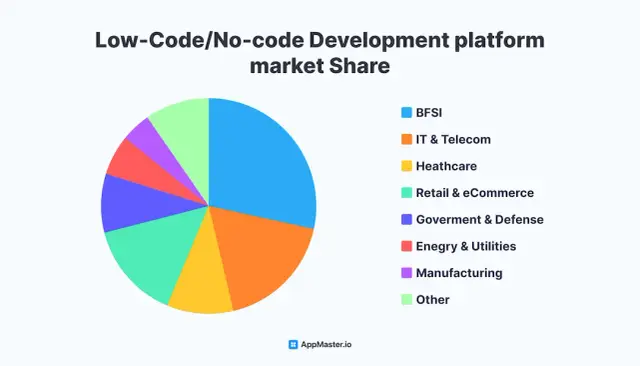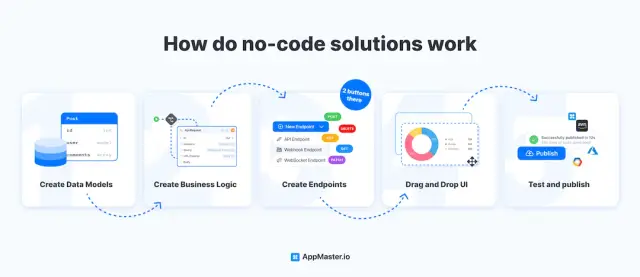Full Guide about Zero-Code
Everything you need to know about zero-code platforms, which one to choose, and how to use them. List of the 5 best zero-code apps included.

The days when you needed to know how to code to build software are over. Today, computer science has evolved so much that we can deploy zero-code tools to create software, web applications, and mobile apps without using or knowing any code. In this article, we'll explore what zero-code is, how to use this type of approach, and its advantages.
What is zero-code?
Zero-code is an approach to programming and software development that does not involve coding, meaning that the developer won't need to write line after line of code in one or more programming languages. Instead, using the proper zero-code tool, developers can use visual interfaces and integrate software components with a drag-and-drop building mechanism.
The no-code platform you'd be using would provide pre-built software blocks and app templates that you can integrate as you wish to create software. With zero-code, the automation of processes, the digitalization of operations, and the process of building apps and websites have become a lot easier, reducing costs and within everyone's reach.
What can zero-code platforms do?
Zero-code platforms are changing the sector of software development and business. They play an important role in a growing phenomenon that we observe in the world of business: the democratization of technology and the affirmation of citizen developers.
With "democratization of technology," we are referring to computers, software, and devices becoming easier and easier to utilize so that computer skills are no more the prerogative of just a few passions.
Citizen developers are more and more numerous in companies all around the world: they are employees who weren't hired for a job in the computer or developing software area but that have the skills to automate processes, digitalize aspects within the company and create software. Zero-code tools are making this possible: they are how citizen developers are able to provide this type of service for their companies.
Unless they are trained in the computer and development sector, employees rarely know how to code. If they know, they know just a little, certainly not enough, to create, say, a web application that provides solutions for clients or their colleagues.
However, with zero-code tools, citizen developers become capable not only of automating some processes but build software and apps, creating software, building websites, create digital solutions for the company and for its interactions with its clients.
Security is also another important team when it comes to zero-code platforms. Thanks to these solutions' features and support teams, security is always enhanced for the software you are creating. It is no longer something you need to take care of on your own, with your own skills, but you can now count on the expertise and knowledge of an entire professional support team.
With zero-code software, development becomes more flexible, less expensive, and less time-consuming. Does it mean that traditional developers (those who are familiar with multiple programming languages) will struggle to continue their work? Not at all. On the contrary, zero-code platforms are solutions that traditional developers and development teams also can exploit: their process would become quicker and easier, letting them take in more and more jobs. As we're about to discover, no-code tools don't deprive skilled developers of the possibility of using programming languages and traditional coding.
Who can use zero-code platforms?
As we've just mentioned, zero-code platforms are a precious tool in the hands of citizen developers, business users, and software developers.

Anyone who needs to build apps or build web applications, anyone who needs to automate processes within their business can deploy a no-code or zero-code platform (no-code and zero-code can be used as synonyms) to create the exact software tool they need for their business or their clients.
The type of no-code tool software developers use can, however, make a huge difference. The principle behind no-code platforms is always the same: providing software developers with pre-built elements and a visual interface to assemble them. However, the degree of freedom you have during your creative process and the level of customization you can reach would depend on the quality of the no-code tool you choose.
AppMaster, for example, is known as one of the best no-code to deploy because:
- it provides a stable framework customizable through many different app templates
- it provides tons of pre-built and well-integrated elements that you can deploy to assemble your app
- it's simple to use
- it provides constant support to developers, business users, and amateurs in any phase of the development process; make sure to test the availability of the platform's support team. You want to make sure you can receive support ASAP when you need it
- it enhances and guarantees security for your app, data, and database
- it provides access to source code
- it allows you to even export source code
- you are the one and only owner of the app you're creating
These are all essential features that can be missed on the no-code app you deploy.
How do zero-code platforms help build apps faster?
In the short term, developing software with zero-code platforms is faster because the entire development process is easier, more intuitive, and requires a lower level of knowledge, skills, and concentration.
Instead of having to write down line after line of code, you can deploy templates and pre-built elements. The process of trying solutions, making mistakes, and finding other solutions is also easier: when you need to try different alternatives, you don't have to write code again and again and again. All you need to do is pick another app template, remove an element and try another, add elements or delete them, and so on.
No-code platforms provide the fastest solution to software development, even when compared to low-code platforms that require some coding. With no-code apps, the process of creating software, automating processes, and so on requires days, not months!
Is zero-code the future?
Zero-code is the future, as we are assisting with the following trends:
- No-code is becoming the future of business app development because it reduces the costs and time of software programming.
- Zero-code solutions and tools are becoming more and more advanced.
- More and more business and business models require customized software.
- The demand for programmers is higher than the available programmers on the job market. No-code seems to be the solution that could fill the gap.
Top 5 zero code platforms
AppMaster
As we've mentioned above, AppMaster is the most recommended no-code software platform out there. It possesses all the essential features a no-code app should have, including access to source code (the one we've listed in the paragraph above).

Furthermore, AppMaster can provide you with the following:
- integrations with third-party software and plugins that make it easier to use an external piece of software and have them run smoothly with the existing ones;
- as you use the pre-built internal and external elements on the pretty and user-friendly visual interface, AppMaster would be creating for you a nice and smooth source code. The automatically generated code is all yours; this is how AppMaster guarantees you full property on the software you are developing.
- the launch process on the iOS or Android marketplaces is also more effective, thanks to the platform's features and the support offered by the team.
AppMaster is the ideal no-code solution if you need to build applications for mobile phones, web applications, data models, databases, or automated business processes.
Adalo
Just like AppMaster, the zero-code software Adalo allows you to assemble building blocks on an app template to create your own project. Assembling happens through a very simple drag-and-drop system, tests can be run with a single click, and - and this is also true for AppMaster - you are also assisted during the launch process of your apps on the, for example, Android marketplace. Last but not least, if you have an existing API, Adalo is the ideal no-code tool for you because you can easily integrate it as your front end just like AppMaster does.
Bubble
Bubble is also a drag-and-drop, no-code system for software and app development. While the interface is less attractive than the ones offered by the two previous zero-code platforms on our list, Bubble's potential is still high.
This zero-coding app has a couple of strong points:
- It has a built-in translation feature that allows you to automatically translate your text to create multilingual apps (however, it is still recommended to have your translation checked by a human!);
- It has analytics features that allow you to check your app performance and scale it up to success.
AppyPie
If what you need is automated features for human resource management and project management, then the zero-code platform AppyPie can be the software for you. It's a zero-code web application that allows you to manage different aspects of your business online. You don't have to learn any code or have any special skill. They also provide a team that assists clients with the use of the platform so that you are never left alone with it.
KissFlow
Kissflow is the perfect no-code solution if you need to:
- automated workflows with a zero-code approach
- create forms that clients or collaborators can fill in online
- manage data and projects more efficiently thanks to customized software
- have reports and create reports (you can also assemble custom dashboards that would display the data you need to see).
Conclusion
With this article, we've provided you with anything you need to know about zero-code. Now you know why you should deploy it, its potential, how it can help you as a programmer, a project manager, or an entrepreneur, and what are the best no-code tools and features out there at the moment.





